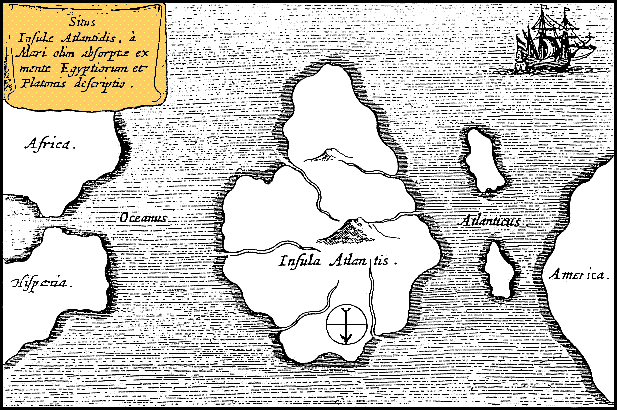If you can only bring one book on Atlantis to a
rapidly sinking desolate island, let this be the one. “Atlantis: Ancient
Legacy, Hidden Prophecy” by John Michael Greer is pro-Atlantis, yet
surprisingly sober. The author has previously published books on such diverse
topics as occultism, fraternal orders, millennialism and peak oil. Indeed,
Greer is both the leader of a small “Druid” group, a Freemason and a magician
working in the Golden Dawn tradition, apart from being a commentator on
contemporary events from a peaknik perspective. In this work, he combines many
of these interests to a unified narrative centered on the myth and reality of
Atlantis, the world's most famous non-existent place (at least this side of
Utopia).
The book contains perspectives on the issue which may be new to most readers, both the true believers used to a faux Mayan Atlantis with black magicians and starships, and hard core debunkers who assume that of course Plato (or Ignatius Donnelly) made it all up. To Greer, the occult Atlantis was originally intended as a “legominism”, a method of teaching whereby ancient wisdom is transmitted through stories which seemingly have a completely different purpose. Madame Blavatsky's fanciful speculations about Atlantis and other lost worlds in “The Secret Doctrine” were legominisms freely based on Donnelly's speculations (at least according to the author – orthodox Theosophists would probably disagree). At some point during their transmission, the esoteric truths they were supposed to convey was almost eclipsed by a fixation on the literal reality of Atlantis and its super-magicians, and we got the sprawling Atlantis myth most of us grew up with (with Lemuria as a more exotic appendix for those “really” in the know).
The author obviously doesn't believe in Atlantis in *this* sense, but he feels that Plato's original story cannot be entirely rejected either.
Basing himself on Lewis Spence and Mary Settegast, Greer argues that Stone Age civilization may have been more advanced than many imagine (while still based on Stone Age technology!), and that the most advanced civilization of this type existed before the end of the last Ice Age. This “lost civilization” – including the island of Atlantis, which Greer places in the Bahamas – was destroyed by large scale flooding about 10,000 years ago.
In conclusion, the author uses the archaeological Atlantis for his very own legominism-like purposes. If human civilization has been periodically destroyed by flood or fire, if Earth itself is a geologically speaking perilous place (even without anthropogenic climate change), if peak oil is a clear and present danger, where does that leave us and our “advanced” Western civilization? The message of “Atlantis” is simultaneously both pessimistic and optimistic. While modern civilization is inevitably destined to decline and fall, with no millennial utopia waiting in the wings, humanity itself (or part of it) could regroup and create a new high culture in the distant future, a high culture not based on fossil fuels but on some other form of energy and technology. Since Atlantis could create a sea empire during the Stone Age, there is still hope for humanity…
While I don't necessarily agree with all the authors' speculations and conclusion, this is definitely the best book on that cursed sunken continent I've read. If you're a naïve believer in constant progress, parts of it may scare you, if you find occult societies mildly entertaining, other parts may entertain you. I noticed both reactions in myself while reading it a couple of years ago. But above all, “Atlantis” has a positive (and serious) message hidden somewhere in between the apocalyptic scare-mongering and the jibes at Lemurian-obsessed Rosicrucians.
Perhaps that's the real legacy of Plato's Atlantis.

No comments:
Post a Comment